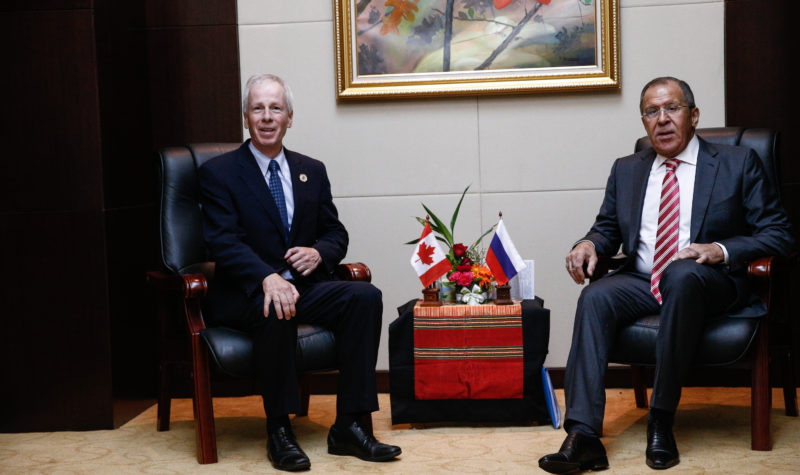Canada signals shift toward greater engagement with Russia in the Arctic

In an address marking the 20th anniversary of the Arctic Council, Canadian Minister of Foreign Affairs Stéphane Dion underlined cooperation with Russia as a key component of Canada’s Arctic policy. This marks a shift away from the more confrontational approach by the previous conservative government.
It was Parliamentary Secretary Pamela Goldsmith-Jones that outlined this approach on Dion’s behalf at an event at Carleton University’s Centre for International Governance Innovation recently. “We have to insist we need a relationship between Canada and Russia in the Arctic,” said Goldsmith-Jones in the speech written by Dion. This is the first major statement on Canada’s Arctic policy since Prime Minister Justin Trudeau’s Liberal government took office.
The speech underlined the importance of cooperation among Arctic governments at all levels, indigenous communities, scientists, the private sector, and technical and policy experts. Cooperation in the region must include Russia, stressed Dion’s speech.
“Between us we control 75 percent of the North. Preventing scientists from these countries from talking is illogical. Our government has put an end to this irrationality,” said Goldsmith-Jones and added “cooperation with Russia on the full range of Arctic issues is simply in our best interests.”
The previous Conservative government led by Stephen Harper was characterized by tough rhetoric on Canada’s sovereignty in the Arctic, as well as promises of investments in military facilities in order to bolster those claims. Competing claims over North Pole put Canada at odds with Russia and others. The Russian annexation of Crimea in 2014 cooled the relationship between the two Arctic powers further. Harper took a tough stance towards the actions, comparing them to Germany’s aggression before the Second World War.
Although international cooperation in the Arctic continued despite the Ukraine crisis and the sanctions that followed, Canada initially attempted to use the region as an arena for diplomatic pressure. In April 2015, a Canadian minister responsible for the Arctic Council boycotted an Arctic Council meeting in Moscow, in what was described as a principled stand against Russia for its illegal occupation of Ukraine.
Russia’s Foreign Minister Sergei Lavrov has reportedly called Stephen Harper a “Russia-phobic” and has signalized to the Trudeau government that Russia looks forward to correct the “mistakes of predecessors.”
“We’re seeing a return to the long-standing post-Cold War position of Canada on Arctic foreign policy, namely that engagement and cooperation are necessary, including with Russia,” said Michael Byers, professor and Canada Research Chair in Global Politics and International law at the University of British Columbia told High North News. He also added that he expects to see more cooperation between the two countries as a result of the policy shift, both within and outside the Arctic Council.
Although the policy shift towards Russia is expected to be welcomed by Arctic scholars, people and diplomats, concerns have been raised over the rapprochement. The Deputy Foreign Minister of Ukraine and former Ukrainian ambassador to Canada expressed concern over the resume in cooperation with Russia over the Arctic, warning Trudeau not to trust Putin in the region, reports The Globe and Mail.
In his speech, Dion maintained profound disagreement with Russia regarding the actions in Ukraine. Canada is taking a leadership role in enhancing NATO and its policy of deterrence and dialogue. “Responsible conviction means engaging even when we disagree,” said Dion, adding that when he met Lavrov earlier this year, they made Arctic cooperation a priority.
While former PM Harper was known to use rather hawkish rhetoric regarding the Arctic, the new Canadian government is adopting a more cooperative tone in the region. “The North is not a place for military confrontation or buildup,” said Dion’s speech. Byers also expects the rhetoric about militarization of the Arctic to disappear. “None of the Arctic countries, including Russia, really want that [militarization],” he said to High North News.
The North did not play a big role in the Liberal Party’s election campaign, and experts have criticized the new government for lacking a clear Arctic policy.
Ahead of the Canadian election in the fall of 2015, Trudeau tweeted “Canada doesn’t need empty rhetoric on the Arctic. Justin Trudeau has a different plan” and called Harper’s approach to the Arctic “Big sled, no dogs.” Despite this claim, John Higginbotham, Senior fellow and leader of the Arctic program at Carleton University’s Centre for International Governance Innovation, said in a commentary that the Liberal government lacks a plan on how to lead, organize and pay for a long term-approach for the Arctic.
Editors of the Arctic Yearbook, Heather Exner-Pirot and Joël Plouffe argue in a recent commentary that Dion missed opportunities in his speech, and that he could have provided concrete strategies to address the sustainable development challenges that plague the Arctic.